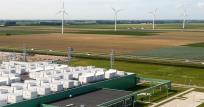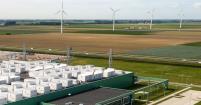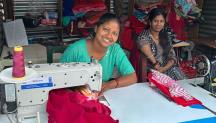

BMW & Microsoft on How Corporations Are in the Driving Seat in the Renewable Energy Transformation
Newsletter
Just as during the Industrial Revolution it was companies that led the push for the spread of steam engines, today many corporations are taking the driver’s seat in the global energy transformation. In 2017, companies in 75 countries actively sourced 465 terawatt hours (TWh) of renewable energy, nearly equivalent to the annual electricity consumption of France.
IRENA engages with the private sector through a variety of platforms and initiatives, including the IRENA Coalition for Action. Earlier this year, the agency published the first comprehensive analysis of corporate sourcing of renewable electricity, with data from over 2,400 companies in more than 40 countries, and found that while roughly one in five corporations has committed to renewable energy targets, there is scope to make them more ambitious. As the IRENA Director-General noted in his keynote address at the Clean Energy Ministerial 9 in Copenhagen, where the report was launched, "Governments alone cannot undertake the energy transformation... The private sector has a key role in accelerating renewable energy deployment".
IRENA spoke with Head of Sustainability Strategy Product & Production at BMW, Jury Witschnig and Brian Janous, Microsoft General Manager - Energy & Sustainability. The two companies are at the forefront of the corporate sourcing of renewables within their respective industries and provided further insights into why corporations are increasingly turning to renewables to power their operations, where they see the greatest opportunities going forward, and what governments can do to support them.
IRENA: What are the factors that are driving your company’s increasing transition to renewables?
BMW: BMW Group sees climate change as one of the most relevant issues of our time. We therefore take a holistic look at CO2 emissions across the complete value chain, and implement measures in all areas to reduce our carbon footprint in line with initiatives like the Carbon Disclosure Project Supply Chain programme. We see an increase of renewables as a long-term business opportunity, based on the fact that they are as cheap as, or cheaper than, fossil fuels. Generation takes place on-site in many cases, through collaboration with partners to generate cost-effective renewable energy (for example wind, solar photovoltaics, biogas and gas from landfill).
Microsoft: Microsoft has one of the largest cloud infrastructures in the world, and energy is the raw material of the cloud - we're taking energy and converting it into data. This creates tremendous value, but also requires a massive amount of energy, leading us to consider the purchase and management of energy as a core component of our company strategy. The procurement of renewable energy is one key method to lower our energy costs while delivering on our responsibilities to our customers. We also look at datacenters as part of the energy supply chain, recognizing that we have a responsibility to leave a legacy that’s not dependent on fossil fuels.
IRENA: What has been your experience, if any, in using innovative corporate sourcing models to procure renewable electricity in Latin America, Asia or Africa?
BMW: Most of our production plants and international activities are in developed markets, often unregulated and with competitive structures. Many of those markets have existing certification systems (for example guarantees of origin, renewable electricity certificates) helping us to realize our target of 100% renewable electricity by 2020. Markets in which these structures are less developed prove more difficult for BMW to scale-up renewables. In those markets, direct access to utilities, ventures and regulators is often the only way for us to realise our ambitious renewable energy targets.
Microsoft: This March, Microsoft announced a 60 MW-peak solar power portfolio agreement with Sunseap Energy in Singapore. In addition to being the largest rooftop solar project in the country, it was the first focused on serving datacenter consumption. The purchase also supported our guiding principle to place an emphasis on the location of our purchases, not just focusing on our renewable energy commitment, but considering how we can best support the growth of the clean energy markets where we operate our datacenters. This principle was also demonstrated in our solar agreement with Atria Energy to help power our new office building in Bangalore, India. In addition to procuring our own renewables, we used the agreement to encourage investments in local solar energy operations as part of a state program driving toward the Indian government’s goal of reaching 100 GW of solar power generation by 2022.
IRENA: What are some of the ways that a company like yours can go beyond 100% and accelerate the transition to a low carbon economy?
BMW: We are striving for 100% renewable electricity purchased in 2020, starting with energy efficiency (45% by 2020 per vehicle produced). Using the most effective way to produce heat for our processes with the lowest CO2 footprint we have built combined heat and power plants worldwide to produce heat. Furthermore, together with Viessmann we have developed a joint venture that offers digital energy solutions for efficiency, charging and flexibility. We also work to improve the charging infrastructure for our customers.
Microsoft: Although we consider renewable energy to be a defining feature of a low carbon future, we are also working to transform energy markets, green grids and develop grid infrastructure at large. These methods enable us to accelerate progress beyond our four walls and build an inclusive infrastructure that can help drive a global transition to that future. When we do procure clean energy, we work to advance the clean energy economies where we operate, strategically investing in markets such as Singapore. We create innovative deal structures in places like Wyoming and Virginia to lower risk and costs for others wanting to engage in the clean energy market, and we've supported critical policy efforts in the United States and Europe aimed at growing these markets. We've also made some big bets with R&D, fighting to reduce our energy footprint and improve utilities' infrastructure to support a greener grid. Recent bets include our Advanced Energy Lab in Seattle, where we created fuel cells that can nearly double data center efficiency, and our partnership with GE in Ireland to test integrated battery storage technology that’s directly mounted on our wind turbines, storing power for use when the wind isn’t blowing.
IRENA: What can governments do to create an environment that is conducive to corporates sourcing renewables?
BMW: Most existing renewable energy solutions have low or no resource input costs. However necessary investments in infrastructure are required. To improve the environment for renewable energy the regulatory framework should be shaped in such a way that minimizes the costs to consumers or utilities.
Microsoft 1) Pursue energy market liberalization which allows creative business solutions within the renewable energy sector to be implemented; 2) Create policies that enable corporate purchasers of renewable energy to own the credits/certificates associated with renewable production; and 3) Establish forums for large energy consumers to share perspective on emerging energy policies and leverage learnings from other geographies. Microsoft prioritizes these transparent and flexible energy solutions when we decide where to locate our next datacenter, and government leaders understanding the magnetism these policies have on foreign direct investment is critical. As demand for renewable energy expands in different geographies, these kinds of policies will further help to proliferate the use of clean energy, spur innovation in business models and technology in the sector, and inspire other companies there to incorporate sustainable practices in their businesses.
IRENA: What is the one message that you would share with policymakers to encourage them to support greater corporate sourcing of renewables?
BMW: Renewable energy is not only meaningful for society; it is a long-term competitive advantage.
Microsoft: In the last year, corporate purchases of renewables in the US represented roughly half of the total demand for renewables. The corporate market continues to be a key driver in the market for renewable energy that pushes the growth of renewables beyond that which is mandated by government or utility targets.
Cover Image: Microsoft’s second European wind project uses 100 percent of the wind energy generated by a newly expanded and reconstructed wind farm close to its datacenter in the Netherlands. Credit: Microsoft




